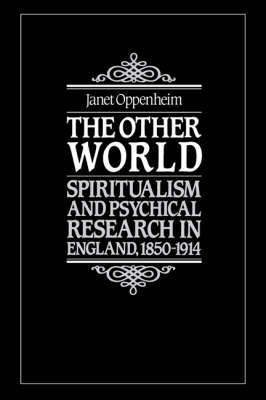
The Other World
Spiritualism and Psychical Research in England, 1850–1914
Seiten
1988
Cambridge University Press (Verlag)
978-0-521-34767-9 (ISBN)
Cambridge University Press (Verlag)
978-0-521-34767-9 (ISBN)
The Other World examines the public fascination with spiritualism and psychical research in Britain from the mid-nineteenth to the early twentieth century. It attempts to understand the reasons why artisans, intellectuals, and aristocrats alike embraced spiritualism as a surrogate religion or endorsed psychical research as the science of the future.
The Other World examines the public fascination with spiritualism and psychical research in Britain from the mid-nineteenth to the early twentieth century. It explores the variety of social background, education, and professional expertise that characterized the men and women who attended séances and investigated psychic phenomena, and it places them in the context of their times without ridiculing their beliefs. It is not concerned with the question of whether psychic phenomena are 'real', but rather attempts to understand the reasons why artisans, intellectuals, and aristocrats alike embraced spiritualism as a surrogate religion or endorsed psychical research as the science of the future. Whether self-educated workers, medical doctors, clergymen, housewives, university professors, journalists, comparative psychologists, or Nobel prize-winning physicists, they cannot be dismissed as cranks and eccentrics. Their efforts to mediate between the demands of science and the comforts of faith reflected anxieties central to the Victorian and Edwardian decades.
The Other World examines the public fascination with spiritualism and psychical research in Britain from the mid-nineteenth to the early twentieth century. It explores the variety of social background, education, and professional expertise that characterized the men and women who attended séances and investigated psychic phenomena, and it places them in the context of their times without ridiculing their beliefs. It is not concerned with the question of whether psychic phenomena are 'real', but rather attempts to understand the reasons why artisans, intellectuals, and aristocrats alike embraced spiritualism as a surrogate religion or endorsed psychical research as the science of the future. Whether self-educated workers, medical doctors, clergymen, housewives, university professors, journalists, comparative psychologists, or Nobel prize-winning physicists, they cannot be dismissed as cranks and eccentrics. Their efforts to mediate between the demands of science and the comforts of faith reflected anxieties central to the Victorian and Edwardian decades.
List of illustrations; Acknowledgments; Introduction; Part I. The Setting: 1. Mediums; 2. Membership; Part II. A Surrogate Faith: 3. Spiritualism and Christianity; 4. Psychical research and agnosticism; 5. Theosophy and the occult; Part III. A Pseudoscience: 6. Concepts of mind; 7. The problem of evolution; 8. Physics and psychic phenomena; Conclusion; Notes; Index.
| Erscheint lt. Verlag | 26.2.1988 |
|---|---|
| Zusatzinfo | Worked examples or Exercises |
| Verlagsort | Cambridge |
| Sprache | englisch |
| Maße | 153 x 235 mm |
| Gewicht | 810 g |
| Themenwelt | Sachbuch/Ratgeber ► Gesundheit / Leben / Psychologie ► Esoterik / Spiritualität |
| Geisteswissenschaften ► Religion / Theologie ► Weitere Religionen | |
| Naturwissenschaften | |
| ISBN-10 | 0-521-34767-X / 052134767X |
| ISBN-13 | 978-0-521-34767-9 / 9780521347679 |
| Zustand | Neuware |
| Haben Sie eine Frage zum Produkt? |
Mehr entdecken
aus dem Bereich
aus dem Bereich
Neue medizinische Fakten zur Nahtoderfahrung
Buch | Softcover (2023)
Patmos Verlag
CHF 34,90
mit einem Geleitwort von Elke Heidenreich
Buch | Hardcover (2024)
Kösel (Verlag)
CHF 41,95


